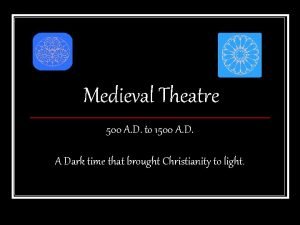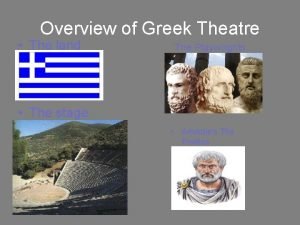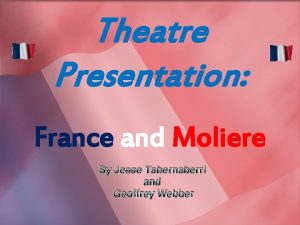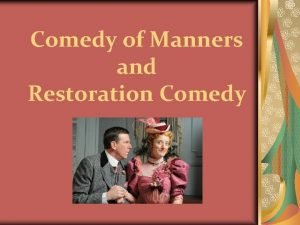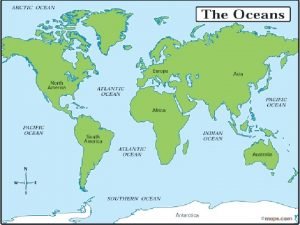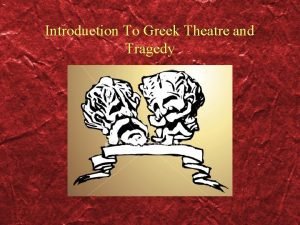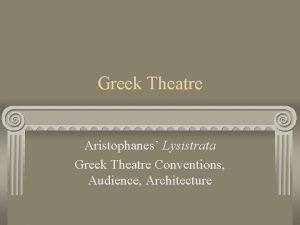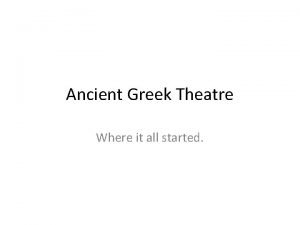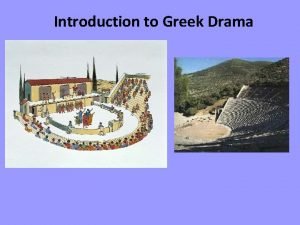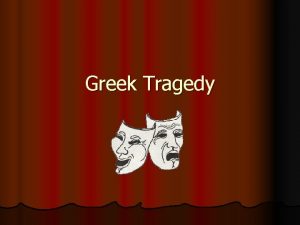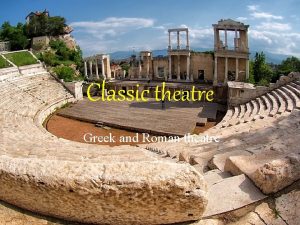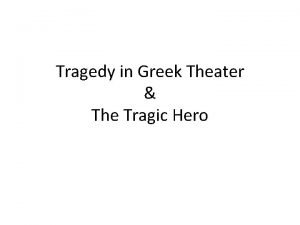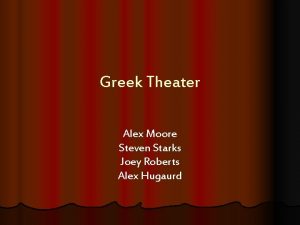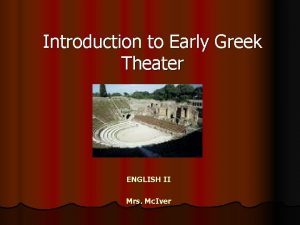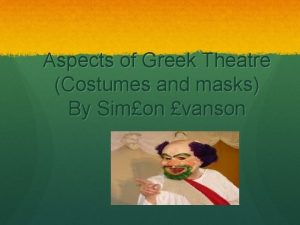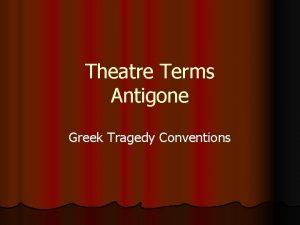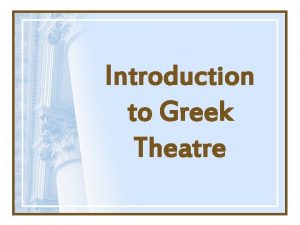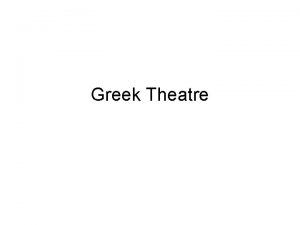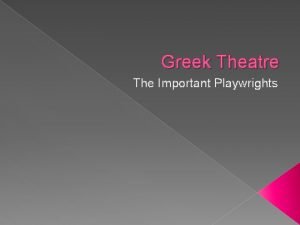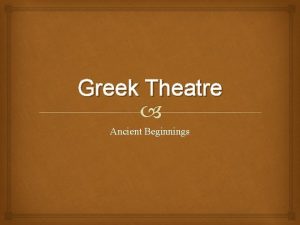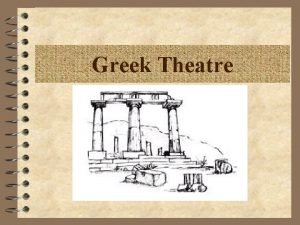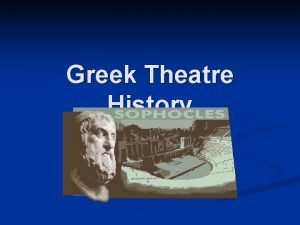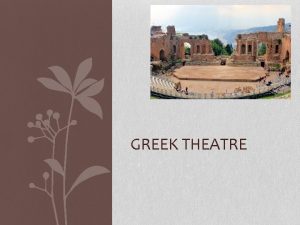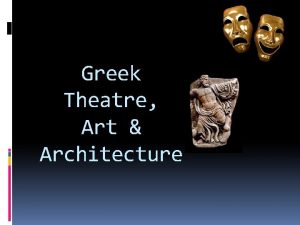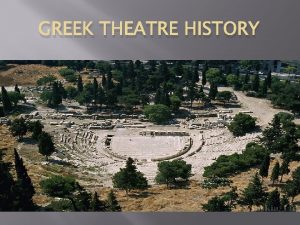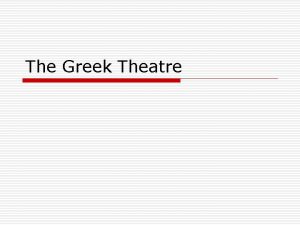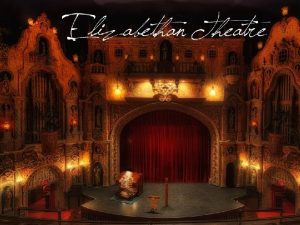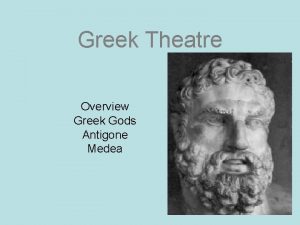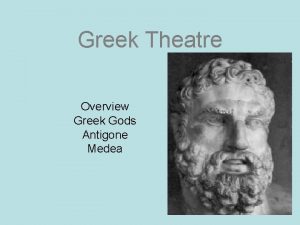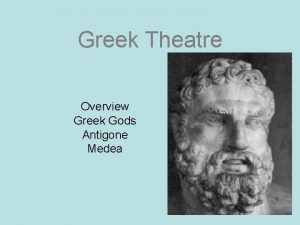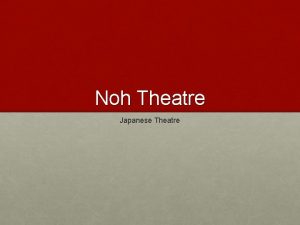Overview of Greek Theatre The land The Playwrights

































- Slides: 33

Overview of Greek Theatre • The land The Playwrights • The stage • Aristotle's The Poetics

The Land • Ancient Greeks attended theatre was one’s civic duty • Greece has thousands of inhabited islands and dramatic mountain ranges • Greece has a rich culture and history • Democracy was founded in Greece • Patriarchal (male dominated) society • Philosophy, as a practice, began in Greece (Socrates, Plato, Aristotle)

The Land Located in Europe by the Aegean Sea

The Land

• The land The Playwrights • The Stage • Aristotle's The Poetics

Amphitheatre

Amphitheatre Three Main Portions of Greek Theatre: Skene – Portion of stage where actors performed (included 1 -3 doors in and out) Orchestra – “Dancing Place” where chorus sang to the audience Theatron – “The Seeing Place” Seating for audience

Ancient Stagecraft Deus Ex Machina - translated as "God out of the machine, " refers to theatrical machine known as machene, which “A mechanical device that permitted an actor, playing a god, to resolve complex dramatic situations. “

Ekkyklema Wheeled cart to move set pieces on and off the acting area

Amphitheatre Thymele Proscenium Skene Arch Theatron Orchestra

From Song to Plays • Greek plays were performed during religious ceremonies held in honor of Dionysus, the Greek god of wine and revelry (altars generally on stage) • Greek invented/formalized three forms of theatre, first Tragedy developed from stories told in choir songs called a Dithyramb, Satyr plays short plays for intermission during Tragedy, and last Comedies • Tragedy means “goat song” (relates to Dionysian rituals)

Where and how were the dramas performed? …In an Amphitheatre …With a chorus who 1. Commented on the action. 2. Provided spectacle by singing and dancing. 3. Played the role of community in the world of the play …With masks …With all the fighting and movement going on off stage. …. With tragedy first, then comedy later.

The Dying and Rising God. Because crops die in winter and return in spring, Dionysus was seen as a symbol of death and resurrection. In another story about his birth, Dionysus was the son of Zeus and Demeter, the goddess of crops and vegetation. Hera was jealous of the child and convinced the Titans to destroy him. Although Dionysus was disguised as a baby goat, the Titans found him, caught him, and tore him to pieces. They ate all of his body except his heart, which was rescued by Athena *. She gave the heart to Zeus, who gave it to Semele to eat. Semele later gave birth to Dionysus again. The story represents the earth (Demeter) and sky (Zeus) giving birth to the crops (Dionysus), which die each winter and are reborn again in the spring.

Dionysia had festivals throughout the farming and harvesting seasons of Grapes. Three months after the rural Dionysia, probably to celebrate the end of winter and the harvesting of the year's crops of grapes and give time to make the years harvest into wine in late spring The City of Dionysia festival was held. • According to tradition, a statue of Dionysus was brought to Athens. •

• As the Statue of Dionysus was brought in, the Chorus leaders would be in the most expensive costumes and leading the chorus to sing a Dithyramb, (Hymns and songs that retold famous stories and myths)

• In Ancient Greece, attending theatre was seen as One’s civic duty. • Winners of the Greek Theatre Festivals won the Tragoidia, which could roughly translates to Goat Song.

• In the beginning large chorus of 50 men would sing a type of song called a Dithyramb

Chorus • To commemorate the god’s death, a group of 50 chanters, called the chorus, dancing around an alter upon which a goat was sacrificed.

• The land The Playwrights & Actors • The Stage • Aristotle's The Poetics

The First Actor • Thespis was the first actor in Greek drama. He was often called the inventor of tragedy, and his name was recorded as the first to stage a tragedy at the Great Dionysia Festival (c. 534 bc).

Major Greek Playwrights Aeschylus Tragedy Seven Against Thebes Sophocles Tragedy Antigone Oedipus Euripides Tragedy Medea Aristophanes Comedy Lysistrata

Aeschylus • Known as the Father of Tragedies • According to Aristotle, he expanded the number of characters in theater allowing conflict among them; characters previously had interacted only with the chorus.

Sophocles • Theban plays consist of three plays: Oedipus the King, Oedipus at Colonus and Antigone. All three plays concern the fate of Thebes during and after the reign of King Oedipus. However, wrote three plays for separate festival competitions, many years apart.

Euripides’ Medea • Contributions of Euripides: Where Aeschylus and Sophocles emphasized plot, by adding an actor each, Euripides added intrigue. Intrigue is complicated in Greek tragedy by the constant presence of the all-knowing chorus. • Euripides also created the love-drama. New Comedy took over the more effective parts of Euripides' technique. In a modern performance of Euripides' tragedy, Helen, the director explained it was essential for the audience to see immediately that it's a comedy.

Aristophanes • Wrote the comedy Lysistrata • Also known as "The Father of Comedy" and "the Prince of Ancient Comedy" • His powers of ridicule were feared and acknowledged by influential contemporaries; Plato singled out Aristophanes' play The Clouds as slander that contributed to the trial and subsequent condemning to death of Socrates, although other satirical playwrights had also caricatured the philosopher.

• The land The Playwrights • The Stage • Aristotle's The Poetics


n o i t a c i l p m co unravelling

Important terms from Aristotle's The Poetics • Tragedy - serious drama featuring a noble dignified character-often a member of royaltywho strives to achieve something and is ultimately defeated • Tragic flaw - character flaw or weakness that results in the character's downfall (usually pride/hubris) • Tragic hero - A character, usually of high birth, neither totally good nor totally evil, whose downfall is brought about by some weakness or


• Hamartia - A tragic flaw, weakness of character or error in judgement that causes downfall in hero • Hubris - Arrogance or overreaching pride which causes hero's transgression against gods; usually tragic flaw • Peripetia - A reversal of fortune

• Nemesis - Fate that cannot be escaped (Antigone) • Catharsis - Purgation of emotions of pity and fear which leaves the viewer both relieved and elated • Anagnorisis - recognition or discovery on the part of the hero; change from ignorance to knowledge

• The structure of Greek tragedy is characterized by • a prologue • then Parodos or entrance of the choirs • Next the story unfolds through three or more episodes • scattered by the stasima, choral song explaining or commenting on the situation developing in the play • The tragedy ends with the exodus, concluding the story.
 Realist theatre
Realist theatre Pageant wagons medieval theatre
Pageant wagons medieval theatre Stagecraft
Stagecraft Anne bollyn
Anne bollyn Neoclassical plays
Neoclassical plays French renaissance theater
French renaissance theater The rover as a comedy of manners
The rover as a comedy of manners An area of land largely enclosed by higher land
An area of land largely enclosed by higher land An area of land largely enclosed by higher land
An area of land largely enclosed by higher land Periaktoi
Periaktoi Greek theatre
Greek theatre Theatron greek theatre definition
Theatron greek theatre definition Conventions of greek theatre
Conventions of greek theatre Greek theatre skene
Greek theatre skene Exodus greek theatre
Exodus greek theatre Dionysus and greek theatre
Dionysus and greek theatre Different types of greek theatre
Different types of greek theatre Greek tragedy definition
Greek tragedy definition Similar
Similar Greek tragic hero
Greek tragic hero Greek theatre special effects
Greek theatre special effects Special effects in greek theatre
Special effects in greek theatre Greek theater masks
Greek theater masks Greek theatre vocabulary
Greek theatre vocabulary Greek drama costumes
Greek drama costumes What is a greek tragedy
What is a greek tragedy Staismon
Staismon Conventions of a greek tragedy
Conventions of a greek tragedy Define greek tragedy
Define greek tragedy Greek theatre video
Greek theatre video Orchestra theatron parados
Orchestra theatron parados Golden age of greek theatre
Golden age of greek theatre Character makeup theatre definition
Character makeup theatre definition Greek theater history
Greek theater history

